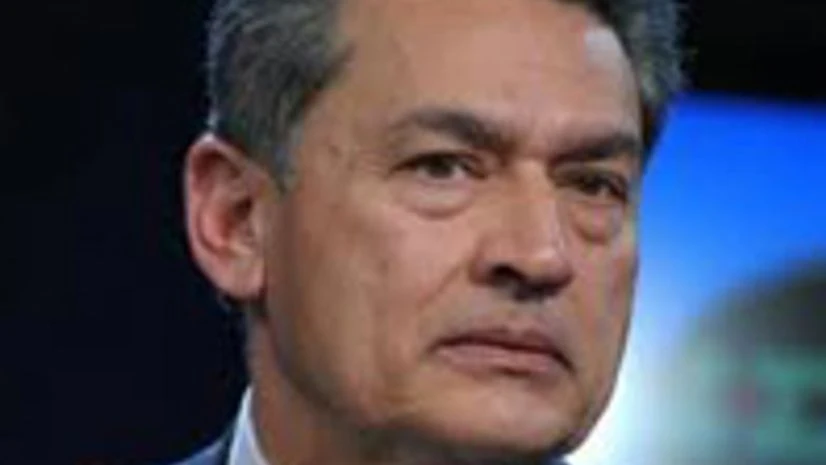Former Goldman Sachs Group Inc director Rajat Gupta is set to ask a federal appeals court in New York today to overturn his insider-trading conviction by arguing the US shouldn’t have been allowed to use evidence from wiretapped phone calls that didn’t involve him.
Gupta has already been handed one victory from the 2nd Circuit Court of Appeals, which will hear today’s arguments. In December, it allowed him to remain free while he fought his conviction. The court had overturned US District Judge Jed Rakoff’s ruling ordering Gupta to surrender to prison authorities on January 8 and begin serving his two-year sentence.
Gupta, 64, who was a managing partner at McKinsey & Co, and a director at Procter & Gamble Co, was convicted by a jury in June of one count of conspiracy and three counts of securities fraud. He was accused of passing illegal information about New York-based Goldman Sachs to Galleon Group LLC co- founder Raj Rajaratnam, his friend and business partner. (PEOPLE LINK)
More From This Section
‘Distorted picture’
“The court’s decidedly asymmetrical interpretation of the rules of evidence left the jury with a distorted picture in which Gupta was accused by the self-serving hearsay of a known fabulist beyond Gupta’s powers to cross-examine, but was unable to explain to the jury that he had neither the motive nor the inclination to benefit that person.”
The jury convicted Gupta of twice passing information about Goldman Sachs to Rajaratnam, once on September 23, 2008, and again on October 23, 2008. Gupta argues for his conviction to be reversed, a new trial to be held and that the government be barred from using the two court-authorised wiretaps. Gupta isn’t heard on either of the September and October 2008 recordings.
Gupta also challenged the legality of the calls secretly recorded by the US and said Rakoff wrongly allowed prosecutors to use three recordings of telephone calls of Rajaratnam talking about his sources, calls in which Gupta wasn’t a participant.
Rajaratnam’s boasts
In one call intercepted by agents of the Federal Bureau of Investigation, Rajaratnam boasted to David Lau, a Galleon trader in Singapore, that he’d gotten a tip from someone on Goldman Sachs’s board.
“I heard yesterday from someone who’s on the board of Goldman Sachs that they’re going to lose $2 a share, the market has them making $2.50,” Rajaratnam said on the call. “I’m going to whack it.”
Waxman and Naftalis argued that the conversation and a second wiretapped call were admitted erroneously under the theory that it furthered the insider-trading conspiracy because prosecutors didn’t allege Lau was a member of the Rajaratnam-Gupta conspiracy and instead called it “inadmissible braggadocio”.
Rajaratnam, who was convicted in 2011 of directing the biggest hedge fund insider-trading scheme in US history, is serving an 11-year prison term at the Federal Medical Center Devens in Ayers, Massachusetts. His request to be allowed to remain free pending appeal was refused.
Gupta’s lawyers echoed arguments of Rajaratnam’s lawyers that prosecutors improperly won authority to wiretap the fund manager’s calls. In October, a panel of three appeals court judges voiced concern over the Rajaratnam wiretaps.
Rajaratnam’s lawyers argued prosecutors misled the federal judge who authorised the wiretaps in 2008 by omitting key facts from their request for the secret recordings.
Daughter’s testimony
Gupta’s lawyers also claim Rakoff erred when he ruled Gupta couldn’t present testimony from his daughter, Geetanjali, about his state of mind prior to the alleged tips. Gupta told her on September 20, 2008, that he’d discovered that Rajaratnam had withdrawn money from the fund, the lawyers said. Gupta lost $10 million and defence lawyers questioned why he would tip Rajaratnam after believing the fund manager had “swindled” him.
Rakoff improperly barred lawyers from presenting evidence that Rajaratnam had an alternative Goldman Sachs tipper, David Loeb, a former Goldman Sachs executive, the attorneys said. Gupta’s lawyers had sought to play wiretapped recordings of Loeb allegedly tipping Rajaratnam and other evidence which Rakoff denied.
Jury confusion
Rakoff ruled during the trial that it was an attempt by the defence to introduce evidence without any witnesses and would confuse the jury.
Prosecutors argued in their brief to the appeals court that Gupta’s conviction should stand, saying there was ample evidence that Rajaratnam and Gupta were partners in several business ventures and that Gupta would benefit from any trades made by Rajaratnam.
“Rajat Gupta was convicted after a fair trial,” Assistant US Attorneys Richard Tarlowe, Damian Williams, Edward Diskant and Justin Weddle said in their brief to the appeals court.
“On appeal, however, he identifies a handful of carefully considered evidentiary decisions that the trial judge decided in the government’s favour and strings them together in an effort to assert, in effect, that the trial was rigged against him.”
They argued the wiretaps were lawfully obtained and said Rakoff had correctly allowed prosecutors to play the secretly recorded calls during the trial because Rajaratnam’s statements were statements against his interest and “were an obvious admission that he had committed a serious crime”.

)
